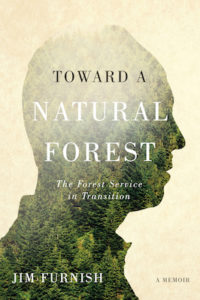When I was a boy growing up in the small Pacific coast fishing and logging town of Astoria, the federal and state agencies responsible for overseeing the rivers, wildlife, and trees were a part of daily life. The agents and rangers were part of our community; not a day went by that you didn’t bump into someone in a green or brown uniform shirt sitting at the counter in the local diner. Not that things were always peaceable. The decrease in the length and catch limits of commercial salmon seasons, the lowering of the timber harvesting levels, and the rise in awareness of the Northern Spotted Owl all took place while I still called Astoria home. Needless to say, coming from a family with deep roots in both the commercial fishing and the logging industries, many of my early ideas about the activities of the men and women working for these organizations were somewhat conflicted.
So when I noticed that the memoir of Jim Furnish, Toward a Natural Forest; The Forest Service in Transition, had been published by Oregon State University Press, my interest was perhaps a bit more piqued than it might have otherwise been. Furnish, a decades-long Forest Service staffer with a career spanning the ranks from ranger to the deputy chief of the entire agency – with a couple significant postings in my own home state – is someone who has truly seen the “sausage being made.” And just as in actual sausage making, the figurative process is not much more pleasant to witness first hand. Reading about it, however, is another thing entirely – especially when what is being read was written by someone honest and open about his own role in it. Someone like Jim Furnish.
As its title implies, Toward a Natural Forest is a record of movement from one place to another, both figuratively and literally. During his years of service Furnish crossed and recrossed the country time and again from the high mountain and cathedral forests of the west to the rarified marble canyons of Washington D.C. With each posting, Furnish gained not only the professional expertise that would eventually enable him to serve with distinction as deputy chief under Mike Dombeck, he also gained wisdom – the wisdom to see, if you will, both the forest and the trees. He came to understand that forests were not simply places from which trees were harvested, or where people went to hunt and fish, but that they were far more complex ecosystems comprised of myriad interrelationships; places from which trees and animals and fish could be harvested, but only if the levels of harvest were kept within the capacity of the forest being allowed to replenish itself naturally.
And Furnish was not the only one who changed over the course of his career. The Forest Service Furnish joined back in 1965 was a very different agency from the one he left (or more the point was pushed out of) in 2002. In 1965 the maximization of timber harvests was the beginning and end of all judgements about how well forest service staff were doing their jobs. Not long before his departure, the codification of a plan to protect wild areas from road building was one of the agency’s top priority projects.
Like most American naturalists, I have regular interactions with representatives of both federal and state natural resource agencies, albeit in quite a different set of circumstances than when I was a boy. After having read Jim Furnish’s memoir of his life in, and the life of, the Forest Service, I believe I now have a far more meaningful understanding of just what it is that they do, the obstacles and challenges that they face, and the dramatic changes that they and their agencies likely have – and in the case of the Forest Service, certainly have – seen over the past few decades.
I highly recommend Toward a Natural Forest to all who enjoy reading a well written, exceptionally honest and unguarded memoir, and I particularly recommend it to everyone who spends any time in the great outdoors, particularly in the western states. For chances are that at least some of this time has been spent on lands managed by the Forest Service, and an understanding of it as an agency is every bit as important as an understanding of how all the other forces that have the powers to change these lands act upon them.
 Title: Toward a Natural Forest; The Forest Service in Transition (A Memoir)
Title: Toward a Natural Forest; The Forest Service in Transition (A Memoir)
Author: Jim Furnish
Publisher: Oregon State University Press
Format: Paperback
Pages: 224 pp.
Published: 2015
ISBN 9780870718137
In accordance with Federal Trade Commission 16 CFR Part 255, it is disclosed that the copy of the book read in order to produce this review was provided gratis to the reviewer by the publisher.
